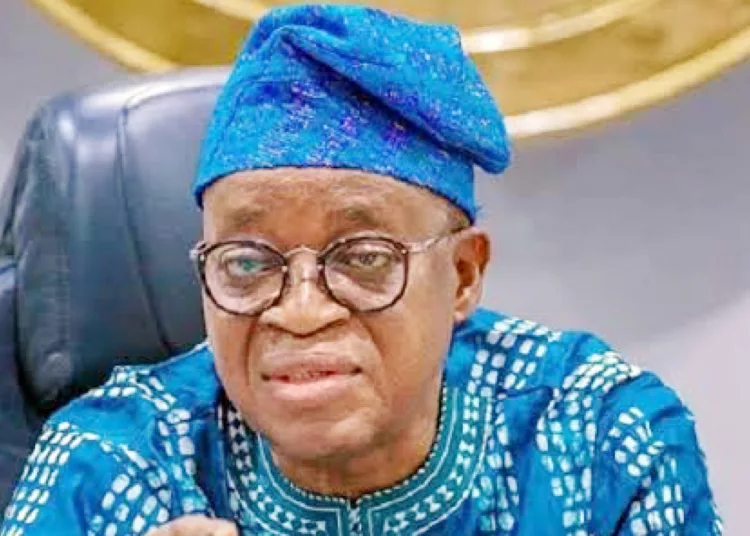In this report, YUSUF BABALOLA examines how the performance bond signed by heads of agencies in the Ministry of Marine and Blue Economy would lead to increased revenue generation for the implementation of the 2024 budget.
The administration of President Bola Tinubu is the first in the history of Nigeria to sign a performance bond with its ministers. The document was meant to hold the supervising ministers accountable and guide them in the pursuit of the renewed hope agenda of the current administration.
However, one of the challenges facing the actualisation of the president’s agenda is liquidity to fund the 2024 budget.
The budget, tagged “Budget of Renewed Hope,” aims to achieve job-rich economic growth, macroeconomic stability, a better investment environment, enhanced human capital development, as well as poverty reduction and greater access to social security by the administration of President Bola Tinubu. With the current government downplaying external borrowing, the focus is now on revenue generation, putting pressure on revenue-generating agencies in the country to provide liquidity for the smooth implementation of the country’s 2024 budget.
To address this, in 2023, the government restructured and refocused some ministries, departments, and agencies to put the country and economy on a new pedestal. Notable policies such as fuel subsidy removal and the floating of the exchange rate undoubtedly created fresh momentum for the economy. These policies, part of which metamorphosed into the establishment of the Ministry of Marine & Blue Economy, have impacted port operations in more than one way, and the agencies under the newly established ministry joined hands with the supervising minister, Adegboyega Oyetola in pursuit of his mandate for the overall benefit of the maritime industry and the nation at large.
Experts in the field argue that the ministry represents a strategic approach for the government to bolster the Gross Domestic Product (GDP) and participate in a global activity capable of generating trillions of dollars in revenue. A marine engineer, Frank Odio said that undoubtedly, the country’s extensive but underutilised blue economy presents substantial opportunities for overcoming its current economic challenges and fostering growth and development.
Other industry specialists emphasise that a committed and sustained exploration of blue economy resources can serve as a catalyst for job creation, improve food security, boost tourism, and enhance infrastructure development. They also said it can give substance to the nation’s pursuit of green energy, among other benefits. Odio also urged Nigeria to emulate the Philippines by leveraging activities in its oceans, seas, and coastal areas, and potentially generate over $70 billion annually for its economy. The Philippines serves as a notable example, generating in excess of $70 billion per year from its marine operations and supplying the global industry with essential middle and low-level workers.
Although the Nigerian Ports Authority (NPA) has, among the notable agencies in the maritime sector, commenced efforts to key into the new vision of the current government, a maritime analyst, Samuel Adenekan, said that comprehensive port digitalisation, incorporating technologies like IoT, Big Data, blockchain, 5G, and AI, is essential for overcoming broader challenges in Nigerian ports.
He said, ‘‘The NPA has reorganised itself to support the actualisation of the new direction of the federal government. Part of the reorganisation was also making the port efficient and effective, even as the reform increased the turnaround time of cargoes, vessels, and the timely release of these cargoes from the ports.
In January 2023, the current NPA management re-engineered and repositioned the agency, triggering fundamental changes such as the increase in revenue generation by the apex maritime organization today, but a lot still needs to be done. He further said, ‘‘Nigeria has six seaports, including Apapa, Tin Can Island, Onne, Port-Harcourt, Warri, and Calabar ports. These ports face inefficiencies, poor governance, delays in cargo clearance, infrastructure deficiencies, and chronic underinvestment. The Haskoning Study in 2002 recommended port concession to private investors through a public-private partnership (PPP) and a shift to the Landlord model for port governance. Years after concession, some upgrades and process automation have occurred, but challenges persist, including delays in cargo clearance, increased clearance charges, high demurrage fees, port congestion, and inadequate equipment and infrastructure.
‘‘The International Maritime Organization (IMO) notes that 90 percent of global trade relies on maritime shipping, emphasising the need for digitalisation in ports. Major global ports like Rotterdam, Hamburg, Antwerp, Singapore, Shanghai, Le Havre, Los Angeles, Copenhagen Malmö, Valencia, and Barcelona have adopted smart technologies such as AI, IoT, big data, blockchain, and 5G.’’
He commended the managing director of NPA, Mohammed Bello-Koko, for outlining a 5-year roadmap to achieve a fully digital ecosystem in Nigeria’s ports by 2025.
However, he said several key smart technologies are still necessary in the Nigerian ports. Experts said while Nigerian ports have automated payments, truck scheduling, and vessel monitoring, advanced technologies like robotics, big data, blockchain, and AI are underutilised. They said implementing AI-driven automated vehicles can eliminate congestion and reduce truck traffic.
An IT specialist, Leke Ojo said, ‘‘Busy ports globally invest in process automation using big data and 5G technology. Nigerian ports face challenges with glitches in IoTs, impacting service delivery. 5G technology can facilitate seamless e-services, reducing delays in cargo clearance and enhancing data gathering. A virtual representation of physical assets, the Digital Twin is operational in Antwerp and Rotterdam ports. Nigerian ports need their own digital twin system for real-time monitoring, situational awareness, and solving congestion issues. Blockchain enables real-time tracking and management of logistics activities. Implementing BCT in the National Single Window platform can streamline cargo manifest generation, duty payments, and reduce clearance fees.’’
A group of IT enthusiasts, XKF Group said the full-scale digitalisation of Nigerian ports, incorporating these technologies, can address generational challenges, making them more efficient and positioning them as Africa’s smartest ports.











